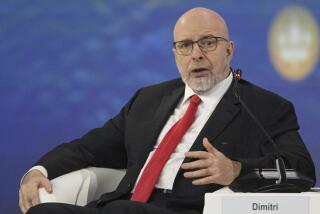Media reports link alleged Russian hacker held in Spain to ‘Trump’s election win’
- Share via
Reporting from Madrid — An alleged Russian hacker has been detained in Spain at the request of U.S. authorities, an arrest that set cyber-security circles abuzz after a Russian broadcaster raised the possibility it was linked to the U.S. presidential election.
Pyotr Levashov was arrested Friday in Barcelona on a U.S. computer crimes warrant, according to a spokeswoman for Spain’s National Court who spoke on condition of anonymity in line with court rules.
Such arrests aren’t unusual — American authorities typically try to nab Russian cyber-crime suspects abroad because of the difficulty involved in extraditing them from Russia — but Levashov’s arrest drew immediate attention after his wife told Russia’s RT broadcaster that he was linked to election hacking on the 2016 U.S. election.
RT quoted Maria Levashova as saying that armed police stormed into their apartment in Barcelona overnight, keeping her and a friend locked in a room for two hours while authorities quizzed her husband. She said that when she spoke to her husband on the phone from the police station, he told her he was told that he had created a computer virus that was “linked to Trump’s election win.”
NEWSLETTER: Get the day’s top headlines from Times Editor Davan Maharaj »
Levashova didn’t elaborate, and the exact nature of the allegations weren’t immediately clear. Malicious software is routinely shared, reworked and repurposed, meaning that even a computer virus’ creator may have little or nothing to do with how the virus is eventually used.
Levashov’s name is familiar in cyber-crime circles. He has been alleged to be spam kingpin Peter Severa, according to Brian Krebs, a journalist who has written extensively about the Russian cyber-crime underworld, and Spamhaus , a group which polices spam.
Levashov himself couldn’t immediately be reached for comment, and officials did not say whether he had a lawyer. The Spanish National Court spokeswoman said he remains in custody.
The U.S. Embassy in Spain declined comment. Russian Embassy spokesman Vasily Nioradze confirmed the arrest but wouldn’t say whether Levashov was a programmer, as reported by RT. He wouldn’t comment on the U.S. extradition order.
“As it is routine in these cases, we offer consular support to our citizen,” he said.
ALSO
Russian hackers were likely surprised by blowback from cyberattacks on U.S. elections, analysts say
If you searched Yahoo for ‘erectile dysfunction,’ you may have enriched a Russian hacker
Trump’s team: A network of ties to Russia
More to Read
Sign up for Essential California
The most important California stories and recommendations in your inbox every morning.
You may occasionally receive promotional content from the Los Angeles Times.










